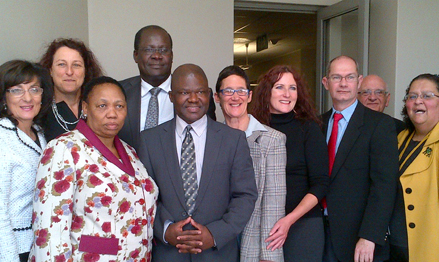Latest News Archive
Please select Category, Year, and then Month to display items
04 April 2024
|
Story Lunga Luthuli
|
Photo SUPPLIED
 Dr Juliet Kamwendo champions gender-inclusive climate action in Africa. Her expertise at the recently held AFR100 workshop highlighted vital steps towards sustainable and equitable development.
Dr Juliet Kamwendo champions gender-inclusive climate action in Africa. Her expertise at the recently held AFR100 workshop highlighted vital steps towards sustainable and equitable development.
Dr Juliet Kamwendo, Lecturer and Programme Director for Gender Studies in the Centre for Gender and Africa Studies at the University of the Free State, is spearheading efforts to integrate gender considerations into Africa's climate restoration agenda. Reflecting on her involvement, Dr Kamwendo stated, "This is particularly crucial, as women make up almost 50% of the population in Africa, and the depletion and degradation of land affect them disproportionately."
She recently served as a gender expert at the AUDA-NEPAD AFR100 workshop in Ouagadougou, Burkina Faso, from 25 to 29 March 2024. This initiative aims to restore forests and degraded land across Africa by 2030, with a focus on gender equality.
The workshop emphasised the integration of gender perspectives into the AFR100 project, acknowledging the disproportionate impact of land degradation on women. Dr Kamwendo's expertise highlighted the need to empower women in climate change interventions, addressing existing gender inequalities exacerbated by environmental degradation.
“Women – who are primarily responsible for household food security and water provision – bear the brunt of environmental degradation, leading to increased workloads, reduced income opportunities, and heightened vulnerability to climate-related disasters. Furthermore, the loss of forest cover and biodiversity further exacerbates the challenges faced by women, particularly in rural areas where they depend heavily on natural resources for their livelihoods,” added Dr Kamwendo.
Her participation highlights academia's crucial role in fostering inclusive and sustainable development, emphasising interdisciplinary collaboration to tackle complex environmental challenges. Through initiatives such as AFR100, stakeholders are working towards a more resilient and gender-responsive future for Africa.
UFS plays leading role in implementing curriculum for deaf learners
2013-08-15
|
 |
Minister Angie Motshekga (front left) joined by members of the South African Sign Language task team. Behind Minister Motshekga’s shoulder is Dr Philemon Akach.
15 August 2013 |
South African Sign Language (SASL) will soon be offered as a school subject to Grade 0–12 learners in all 42 schools for the deaf in South Africa. Our Department of South African Sign Language had a role to play in this significant development that will empower deaf learners in South Africa and the continent.
Dr Philemon Akach, Head of the Department of South African Sign Language at the UFS, is part of the nine-member task team that recently handed over the SASL curriculum to the Minister of Basic Education, Angie Motshekga. The curriculum will be offered as a home language in all schools from 2014 and Grade 12 learners will be able to write it as a final-year examination subject.
Dr Akach – a member of the task team since 2009 – helped to coordinate the development of the curriculum.
The implementation of the curriculum means a lot to the Department of South African Sign Language, Dr Akach says. “We have championed the linguistic needs of the deaf community ever since we became the first university to offer SASL as an academic course, not only in South Africa, but also on the continent.”
Dr Akach says most Education students are already taking SASL as subject in his department, equipping them as prospective teachers to make implementation of the curriculum a smooth one. “Given our expertise, we will train teachers in the field and be involved in the setting and moderation of exam papers. The University of the Free State is no doubt a leader in this field.”